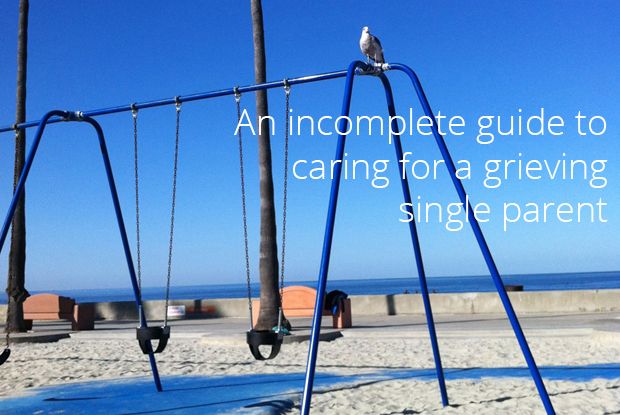Clichés like “it will get better with time” are usually quite true, but rarely worth saying aloud when someone is crying or in the extra fresh stages of grief.
When my husband left, it wasn’t a clean break. It was an extended, complicated, emotional, professional and economic hurricane. I bring this up not to start a contest about whose divorce was worst, but to explain that my season of grief, confusion, and desperation was not tidy or short.
To put it bluntly, I was needy for a long time as I struggled to get financial, emotional, and spiritual stability.
Some people are naturally pretty skilled at engaging hurting people, but most of us, especially when confronted with a loss we haven’t personally experienced, feel fairly confused about what to say and do.

My dad died when I was a kid, so divorce wasn’t the first huge loss I had encountered, or the first time I had experienced people who didn’t know what to say to me about my life circumstances.
When I went through separation and divorce, some people were helpful and some people were not.
Even at the time, I envisioned writing some sort of instruction manual for friends wanting to help a grieving, wounded, heart-broken mom trying to unravel and recover from the end of a relationship. I never imagined I would actually have a place to share those thoughts.
Here, at Simple Mom, seems to be the right place; a community of caring, determined people, who seem to truly want to grow and improve their own life and the lives of those around them with both external and internal simplicity.
But living simply doesn’t just mean clutter-free kitchens or an un-rushed schedule for its own sake, right? We desire to live simply, in order to live authentically and be available for genuine relationships. And that means not ignoring the realities of grief and pain.
And so, at the risk of making generalizations, but with the hope of giving some guidance to those who truly desire to love a grieving single parent in their life, I give you this list of suggestions. It is my hope that because of these words, a few single moms and dads will get loved a little better by those around them.

1) Say this out loud directly to your friend:
“I really care about you. I know that you’re hurting but I don’t know what would be helpful right now. What do you need?”
It is true that not every hurting person knows exactly what they need, and that’s okay. But many do know, and just need to be asked by a safe person.
I felt most loved when people acknowledged that I was in deep pain, that they wanted to do something, but they were also aware they didn’t know what would be helpful to me.
We all need different things when grieving. The differences in the children’s ages and life stages also come into play.
One woman may be an introvert and be desperate for some time away from her children to process. Another may crave some verbal processing. One parent may not want other people cooking for her, but would appreciate just doing an outdoor activity with another family for some variety.
If you ask, and they know a specific way they would feel loved, then great! If they don’t know or they are too overwhelmed in that moment, suggest that they think about it, and let them know they can contact you. Mention you’ll follow up to check in again if that’s okay with them.
If they don’t have a reply, then you have at least communicated your interest and availability to help and care for them. That opens up conversations and space for love to flow.
2) Do not offer to do something unless you’re going to do it.
Let me repeat that. Do not make a promise to do something, or make any offers, unless you are committed to follow through to the best of your ability.
Remember that you are dealing with a person who, no matter the specifics of her circumstances, has experienced some intense rejection and abandonment, to say the least. You can cause more pain if you offer to help just because you think it’s polite or you don’t know what else to say.
If you genuinely can’t babysit, or hang out, or whatever, that’s totally okay. Take a deep breath and be aware of your limitations and boundaries. And then be honest.
If you have your own life mess happening and you can’t be available to her, be honest about that as sensitively as you can, or simply don’t make any promises you know you can’t follow through on.
If you have no capacity to babysit or drop her off at the mechanic, that’s fine. Offer what you can, and if you can’t offer much… guess what. She probably understands since she feels like she has so little to offer, too!
3) Say positive things out loud, but be wary of clichés and assumptions.
There are things that are obvious to you that may or may not be obvious to the hurting parent in front of you. When appropriate, speak aloud, but tread gently. This may include but not be limited to:
• I think you are a great mother.
• I really don’t mind just being here with you, even if you don’t feel like talking.
• This experience will not define your life. But, you don’t need to be in a rush to feel “better.”
• I’m proud of you for all the energy you are investing in your child(ren) even in this tragic time.
• It hurts me to see you hurting and I really care about you.
• If you think of a way I can help you out, please don’t hesitate to let me know.
• It’s okay to need help. It’s okay that you can’t survive this season of life alone.
• I want to be here for you to process this if you want to, and even though I may not understand exactly what you’re going through, I just really care about you.
I know every single parent has very different circumstances, children, and personality, but I hope this is helpful for a few people who have desired to know how to engage with a fellow parent experiencing the end of a relationship.
What’s something helpful that someone else said or did for you when you were experiencing loss?



